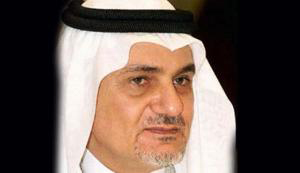Prince Turki al-Faisal, a former Saudi intelligence chief and ambassador to Washington, warned senior Nato military officials that the existence of a nuclear weapon "would compel Saudi Arabia ... to pursue policies which could lead to untold and possibly dramatic consequences", The Guardian reported.
He did not state explicitly what these policies would be, but a senior official in Riyadh who is close to the prince said yesterday his message was clear.
"We cannot live in a situation where Iran has nuclear weapons and we don't. It's as simple as that," the official said. "If Iran develops a nuclear weapon, that will be unacceptable to us and we will have to follow suit."
Officials in Riyadh said that Saudi Arabia would reluctantly push ahead with its own civilian nuclear programme. Peaceful use of nuclear power, Turki said, was the right of all nations.
Turki was speaking earlier this month at an unpublicised meeting at RAF Molesworth, the airbase in Cambridgeshire used by Nato as a centre for gathering and collating intelligence on the Middle East and the Mediterranean.
According to a transcript of his speech obtained by the Guardian, Turki told his audience that Iran was a "paper tiger with steel claws" that was "meddling and destabilising" across the region.
"Iran ... is very sensitive about other countries meddling in its affairs. But it should treat others like it expects to be treated. The kingdom expects Iran to practise what it preaches," Turki said.
Turki holds no official post in Saudi Arabia but is seen as an ambassador at large for the kingdom and a potential future foreign minister.
Turki also accused Iran of interfering in Iraq, Lebanon, Syria, and in the Gulf state of Bahrain, where Saudi troops were deployed this year as part of a Gulf Co-operation Council force following widespread protests from those calling for greater democratic rights.
Though there has previously been little public comment from Riyadh on developments in Syria, Turki told his audience at Molesworth that President Bashar al-Assad "will cling to power till the last Syrian is killed".
"The loss of life [in Syria] in the present internal struggle is deplorable. The government is woefully deficient in its handling of the situation," Turki said at the Molesworth meeting, which took place on 8 June.
Turki also reiterated a long-standing Saudi call for a nuclear free zone in the Middle East, which would include both Iran and Israel and would be enforced by the United Nations security council.
The prince said sanctions against Iran were working. He welcomed the consensus in Washington that military strikes against Tehran would be counterproductive.
William Hague, Britain's foreign secretary said that Iran has recently conducted covert tests of ballistic missiles as well as at least three secret tests of medium-range ballistic missiles since October.
Iran and the west remain in dispute over its nuclear programme. The US and its allies insist Tehran aims to develop atomic weapons, a charge that Iran rejects.






